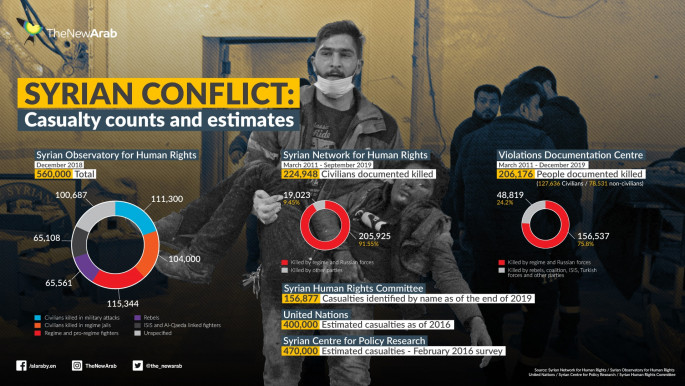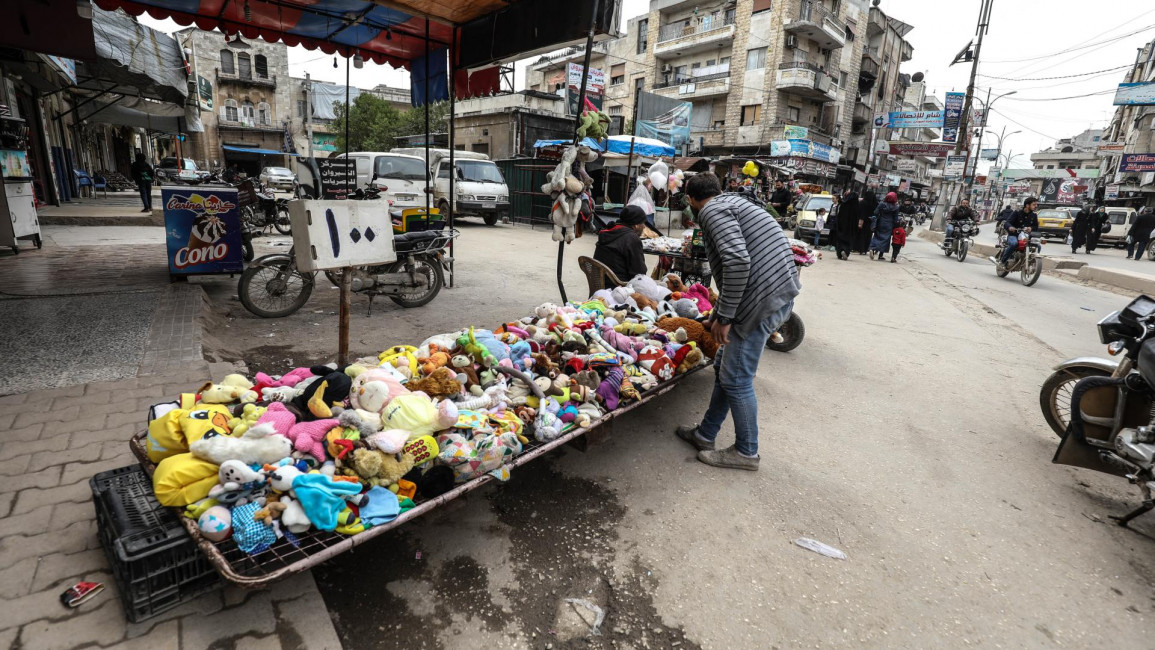Syrians forced to break coronavirus restrictions to feed their families
Syrians forced to break coronavirus restrictions to feed their families
Syrians are venturing out despite the regime's coronavirus restrictions to put food on the table for their families.
3 min read
Syrians are struggling to self-isolate at home and also put bread on the table [Anadolu/Getty]
Many Syrians living in the southwestern city of Suweida were following the regime's measures to prevent a largescale outbreak of coronavirus.
But three weeks into the restrictions, Syrians are venturing out again, opening shops and returning to work to put food on the table for their families.
But three weeks into the restrictions, Syrians are venturing out again, opening shops and returning to work to put food on the table for their families.
Ruwaida Muhanna is among Suweida's shopowners who could no longer afford to keep their doors closed.
She told The New Arab's Arabic-language service that her shop, which sells cosmetics and accessories, "is the only source of my family's livelihood".
"My three children are reliant on it after my husband's work stopped in Lebanon and he was no longer able to send us money. I opened the store after I saw many shops open their doors," she added.
"People cannot live without work, and we barely save enough for our daily expenses since prices have gone up significantly."
Ruwaida's situation is echoed in many households across the city.
She told The New Arab's Arabic-language service that her shop, which sells cosmetics and accessories, "is the only source of my family's livelihood".
"My three children are reliant on it after my husband's work stopped in Lebanon and he was no longer able to send us money. I opened the store after I saw many shops open their doors," she added.
"People cannot live without work, and we barely save enough for our daily expenses since prices have gone up significantly."
Ruwaida's situation is echoed in many households across the city.
On Abu Walid Street in Suweida's city centre, known for its stores selling cotton and bridal equipment, more than one shop is welcoming customers.
The anxiety is palpable amongst shopowners, who nervously watch the street's main crossing.
"The situation is unbearable. We are afraid that the police will come and fine us. Why did they not make a unified decision to suspend the payment of rents?" one shop owner told The New Arab, on the condition of anonymity.
The anxiety is palpable amongst shopowners, who nervously watch the street's main crossing.
 |
|
| [Click to enlarge] |
"How can I pay rent on the store and my house if the markets remain closed and travel is forbidden?"
"I have four employees working for me and they need their salaries to cover their expenses. I am not able to cover it all, especially since the price hike caused a depression," he added.
Near the market, Muhannad Al-Masry was moving sand and gravel into a construction site with a group of young men.
He told The New Arab: "We stopped working for 15 days, and thank God we did not show any symptoms. We have a lot of needs at home."
"I heard that many countries have given their citizens aid, but here no one asked us about our situation or how we can go about getting bread."
He told The New Arab: "We stopped working for 15 days, and thank God we did not show any symptoms. We have a lot of needs at home."
"I heard that many countries have given their citizens aid, but here no one asked us about our situation or how we can go about getting bread."
The Syrian regime has recorded 19 cases of coronaviruses and two deaths.
The regime shut markets, schools and universities on 15 March as part of sweeping measures to control the spread of coronavirus. It has extended these restrictions until 16 April.
Read more: 'Our fear is doubled': Exhausted by war, Syrians struggle to cope with coronavirus pandemic
Movement between governorates, and between rural and urban centres, has also been blocked, causing many Syrians to lose work.
Syria was among the last countries in Asia to officially register any cases of Covid-19, arousing suspicion that there had been a government cover-up, especially due to the number of Iranian fighters, which has been especially hard-hit by the virus, coming into Syria.
Nine years of gruelling civil war has eroded healthcare facilities in both regime and opposition-held areas, meaning the country is considered at very high risk of a large-scale outbreak.
Follow us on Facebook, Twitter and Instagram to stay connected
The regime shut markets, schools and universities on 15 March as part of sweeping measures to control the spread of coronavirus. It has extended these restrictions until 16 April.
Read more: 'Our fear is doubled': Exhausted by war, Syrians struggle to cope with coronavirus pandemic
Movement between governorates, and between rural and urban centres, has also been blocked, causing many Syrians to lose work.
Syria was among the last countries in Asia to officially register any cases of Covid-19, arousing suspicion that there had been a government cover-up, especially due to the number of Iranian fighters, which has been especially hard-hit by the virus, coming into Syria.
Nine years of gruelling civil war has eroded healthcare facilities in both regime and opposition-held areas, meaning the country is considered at very high risk of a large-scale outbreak.
 |
Follow us on Facebook, Twitter and Instagram to stay connected


